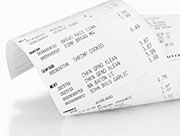- The Best Time of Day to Drink Bone Broth to Maximize Health Benefits
- 8 Ways to Increase Dopamine Naturally
- 7 Best Breads for Maintaining Stable Blood Sugar
- Gelatin vs. Collagen: Which is Best for Skin, Nails, and Joints?
- The Long-Term Effects of Daily Turmeric Supplements on Liver Health
- Could Your Grocery Store Meat Be Causing Recurring UTIs?
- Are You Making This Expensive Thermostat Error This Winter?
- Recognizing the Signs of Hypothyroidism
- 10 Strategies to Overcome Insomnia
- Could Artificial Sweeteners Be Aging the Brain Faster?
Cashiers May Absorb Controversial Chemical When Handling Receipts


People who work a cash register all day are most likely absorbing a potentially toxic chemical from the receipts they handle, new research finds.
Thermal receipt paper contains bisphenol A (BPA), which is used to prevent the color on paper from running or bleeding.
Researchers discovered that people working a two-hour shift at a cash register saw their BPA levels increase three to five times from handling the receipts, according to the research letter published in the Feb. 26 issue of the Journal of the American Medical Association.
However, the authors noted that the peak BPA levels were still lower than have previously been seen in people after consuming canned soup.
“What is a concern is a lot of these cashiers who handle receipts 40 hours a week are pregnant or of fertile age,” said report author Dr. Shelley Ehrlich, an assistant professor of biostatistics and epidemiology at the University of Cincinnati College of Medicine.
BPA can mimic the female hormone estrogen, and concerns have been raised about its effects on unborn babies and young children. The U.S. Food and Drug Administration has banned its use in sippy cups, baby bottles and infant formula packaging.
“There’s quite a huge body of literature that shows that it has adverse health effects even at low doses,” Ehrlich said.
Ehrlich and her colleagues recruited 24 students and staff at the Harvard School of Public Health to work a simulated two-hour shift on a cash register that used thermal receipt paper.
Research into BPA exposure up to now has focused on ingestion of the chemical through its presence in plastic bottles and aluminum can linings, she said.
“Absorption is usually through the oral route, through ingestion,” Ehrlich said. “This is an additional source of exposure that had not been previously explored and needs to be considered as well.”
The amount of BPA in the participants’ urine jumped considerably as a result of handling the receipt paper, the researchers found. It rose from an average 1.8 micrograms per liter before the shift to 5.8 micrograms per liter in urine samples taken a couple of hours after the shift ended.
Follow-up tests found that BPA levels could rise as much as five times in samples taken six hours after the shift ended.
Half the participants later came back to work another two-hour shift on the register, but this time they wore gloves. The gloves appeared to prevent absorption of the BPA, and researchers detected no significant increase in urinary levels of the chemical.
“It seems that BPA can be significantly absorbed through the skin after continuously handling receipts for two hours,” Ehrlich said. “Gloves do seem to act as a barrier.”
Ehrlich noted that BPA levels did not increase as much as they do when the chemical is ingested with food. “The increase is still within the range of the general population,” she said.
But it might be a good idea for people to wash their hands after handling a thermal receipt, she said. Young or pregnant cashiers may want to wear gloves while working the register.
However, one doctor said people shouldn’t read too much into what was a small report on a chemical whose toxic effect has not been proven or fully assessed.
“I think we tend to over-concern ourselves with the environmental presence of these substances,” said Dr. Neil Goodman, a professor of endocrinology at the University of Miami Miller School of Medicine.
“Humans are here because we can deal with low levels of toxins and continue our lives,” Goodman said. He added that the liver does a very good job of screening substances out of people’s bodies, eventually through urine.
“As a scientist trying to figure out what we really need to be concerned about, I think we spend too much time on this background stuff where we don’t know what the health concerns actually are,” he added.
While the research found an association between working with cash register receipts and increased levels of BPA in the body, it did not establish a cause-and-effect relationship.
Ehrlich also said that people should not take her findings to heart until follow-up research confirms the health risks.
“I don’t want employers to start laying off pregnant women. That would be horrible,” she said.
More information
For more information on BPA, visit the U.S. National Institutes of Health.
Source: HealthDay
Copyright © 2026 HealthDay. All rights reserved.










